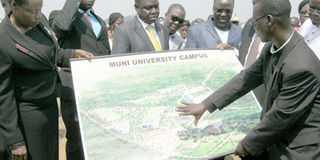Mixed reactions as West Nile gets first University

The secretary Muni University, Dr Epiphany Odubuker, shows Education Minister Jessica Alupo (L) the artistic impression of the university after a ground-breaking ceremony last week. PHOTO by AL-MAHDI SSENKABIRWA.
After a long wait, West Nile region has finally got a public university which will open its doors to pioneer students next academic year. However, the coming of Muni University, named after a hill in Arua Town, has drawn mixed reactions from locals with a cross section expressing fears that their daughters and sons may find it difficult to get enrolled in the institution due to the poor academic standards in the region.
“Yes, a university has come but the academic performance is declining in our region. How shall we fit in this new university with these poor grades at lower levels?” asked Mr Sam Wadri, Arua District chairperson. But Mr Martin Drito, the MP for Madi-Okollo County, says: “This is an early New Year gift for the region and we must welcome it and support the entire project to bear fruits.”
Mr Bernard Atiku, the MP for Ayivu County, on the other hand, said although he belongs to the opposition, the institution should serve as a unifying factor for different political actors so that they redeem the region from illiteracy and poverty.
“It is good that the university is going to be an innovative and specialised one, meaning that it will help in transforming and developing the region,” he said .
However, Mr Francis Okuonzi, of River Oli Division, described the opening up of the university as a political gimmick by the NRM government to hoodwink masses in the region.
“This government is just joking. There is no way you can boast of changing society when elementary education which serves as the foundation, is poor here ,” he says .
He says the region is lagging behind in almost all public spheres of life yet the rest of the country is developing.
“We are getting nothing as far as service delivery is concerned. There are no drugs in hospitals, no electricity to run our businesses and it appears like we are not part of Uganda,” Mr Okuonzi said.
For the past four years, the region has had one pupil scoring Aggregate 4 in the Primary Leaving Examinations. The region’s star, Haman Baba, sat his exams last year and was pupil at Arua Public Primary School.
Poor performance of pupils in West Nile has always been blamed on lack of scholastic materials, overcrowding in classes and lack staff housing for teachers, a situation shared by several schools in the country, especially up-country. The situation is no different at secondary level.
Recent findings in the region indicated that less than 35 per cent of teachers are housed on the school premises and most children (70 per cent ) lacked at least one exercise book for each subject.
The university has already secured vast land measuring 130.054 acres although some land is scattered in different areas in the region where other campuses will be established.
Although the main campus will be at Muni Hill, 2Km southwest of Arua Town, one campus will be located in Okollo Town, 58Km southeast of Arua Town. The other two campuses will put in Bidibidi –Yumbe District and in Pakwach –Nebbi District.
Although no infrastructure has not been set up at the proposed main campus site and the university council not yet constituted, the vice chancellor, Dr Christine Dranzoa, is optimistic that academic programmes will commence as planned.
“Putting up structures is not a big issue. A contractor (Ambitious Construction Company Ltd) has already been identified and construction works are going to kick off soon and by mid next year, some buildings will be in place,” she said .
According to Dr Dranzoa , the university will start with the Faculty of Technosciences which will offer courses such as Bachelor of Science in Computer and Information Technology; Bachelor of Nursing Sciences; Bachelor of Science in Technical and Vocational Education, Bachelor of Information Systems, Bachelor of Science with Education.
Other co-requisite courses include, Entrepreneurship and Small Business Management, Peace and Ethics, Communication and Study Skills and Computer Literacy will be rolled out later, according to Dr Dranzoa
During a ground-breaking ceremony for the university last week, Education Minister Jessica Alupo said government was committed to providing whatever is required for the university to start.
The South Korean government has already committed $30m (about Shs75b) for infrastructural development in addition to Shs1.4b released by government for the same purpose.
Ministry of Education Permanent Secretary Francis Lubanga advised the university admission department to partner with the private sector to set up hostels for students from far areas as government devises means to erect halls of residence.
This will be the first public university in the West Nile sub-region and is expected to attract students from DR Congo, South Sudan and even Central African Republic.
With Teso sub-region also set to get a public university, it is now Bunyoro , Busoga and Karamoja sub-regions which will lack public universities. The country currently boasts of five public universities (Makerere, Kyambogo, Mbarara ,Busitema and Gulu) and 24 private ones.
The enrolment in public universities stands at over 125,000 from less than 5,000 in 1986; while the total enrolment at higher institutions (universities and tertiary) institutions is at over 178,000.




